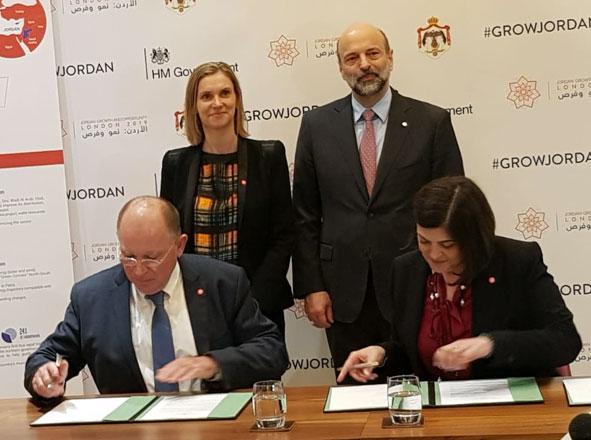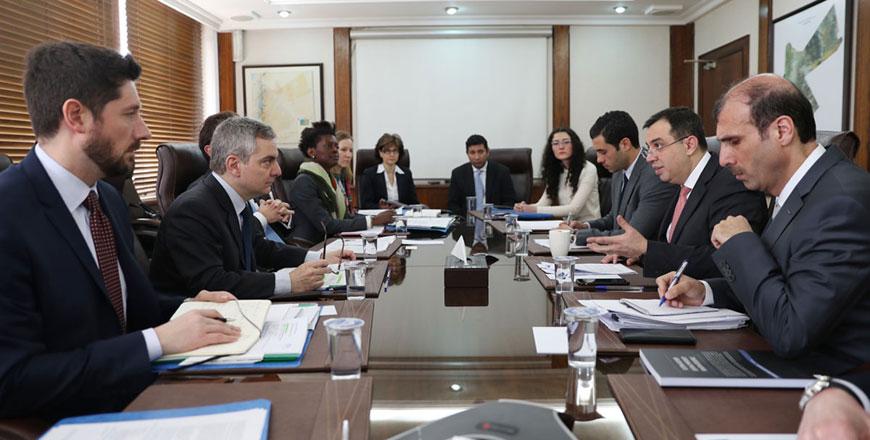You are here
EIB willing to invest in Jordan’s resilience
By Omar Obeidat - Feb 04,2016 - Last updated at Feb 05,2016
 |
| Werner Hoyer |
AMMAN – President of the European Investment Bank (EIB) Werner Hoyer on Thursday said the bank will respond to what Jordan identifies as its economic needs and priorities as part of its long-term plan for the Kingdom.
In an e-mail interview with The Jordan Times, Hoyer said the EU bank has been working closely with the Jordanian authorities on several strategic plans that include the Water Sector Capital Investment Plan for Jordan 2016-2025, which, he said, was approved very recently by the board of directors.
This sets out for the next 10 years the measures, investments and actions needed to manage scarce water resources, he said, adding that the Luxembourg-based bank has also started discussions on an "important" programme called the Mediterranean Hotspots Programme, which will support priority investments with a mixture of EIB and EU resources.
Hoyer, who was participating in Thursday's Supporting Syria and the Region Conference in London, said the EIB group is engaged in the region — financing infrastructure projects and private sector support that can benefit both refugees and the local population.
"We need to do more of this, and we need to do it quickly, hand in hand with partners, in close cooperation with other financial institutions and donors. We can help with hospitals. Children need schools. We know that provision of basic services such as water and sanitation also helps to bring stability to the region, creating jobs. But these projects need to be bankable with underpinning grants and guarantees from donors," he said.
In Jordan, he said, an EIB loan is blended with EU investment grants to support the Wadi Al Arab Water System project to address the pressing and urgent issue of water scarcity, made more urgent by the influx of Syrian refugees.
The project will improve drinking water availability for the growing population in the northern governorates, which has been significantly increased by the large number of Syrian refugees in the area.
"At the same time, we are looking closely at how we might further develop lending to small businesses in Jordan as we are doing in Lebanon and Egypt with impressive results," the EIB chief said.
‘World should do more’
Hoyer said the international community can and should do more to help countries like Jordan at the front line of the refugee crisis to handle these challenges.
“It is clear too that the will is there to do this and we have heard their expression from many corners at the Supporting Syria and the Region Conference that we have been attending in London. It is clear that the repercussions of the Syrian conflict are being felt well beyond the country itself and nowhere more so than in Jordan,” he added.
Hoyer said, however, that the supporting Syria conference’s pledges must be translated into action.
That means in the first instance, humanitarian assistance, but also measures to promote economic development, to support resilience, and job creation and key infrastructure that can help the men, women and children affected by this crisis, he said.
“As the EU’s bank we are prepared to support this effort with ambition and expertise,” he said.
More investments
Hoyer said that in the coming five years the EIB plans to lend over 15 billion euros ($16.5 billion) in its ten Mediterranean partner countries and in Turkey.
Increasing this further could be done, in partnership with donors and partner countries, combining EIB expertise and ability to leverage scarce resources with grant funding, the EIB chief said.
The bank is ready to step up its efforts even further by offering to lend an additional 3 billion euros (of which about 2 billion euros in Jordan, Lebanon, Turkey and Egypt alone) over the course of the next five years within its current mandates and own balance sheet.
London conference
On the importance of the London conference and expectations, Hoyer said one of the prime aims of the London conference is precisely to bring this economic assistance to host countries.
“I believe we must be ambitious and I have told the conference that with these necessary conditions in place, total EIB Group financing to Turkey and the MENA region over the next five years could be up to 23 billion euros. That is another 50 per cent on top of what we had planned.”
EIB’s investments in Jordan
The EIB financed the Tafileh Wind Farm Project, which comprises the construction and operation of a greenfield wind farm independent power producer to
produce 117 megawatts of electricity in Jordan.
On future opportunities, Hoyer said decisions about the precise nature of the investments rest ultimately with the Jordanian authorities “with whom we are in close contact”.
Certainly the investment in energy, and in particular the renewables sector, is a priority both for Jordan and the EU’s own external policy, he said.
“We would also like to help develop Jordan’s private sector with different initiatives from microfinance to support for start-ups and SMEs. These offer opportunity, jobs, long-term growth and — vitally at the moment — hope,” Hoyer noted.
Related Articles
AMMAN — Jordan stands to benefit from a 300-million-euro loan agreement from the European Investment Bank (EIB) which aims to enhance growth
LONDON — Several countries pledged concessional loans, grants and technical assistance for Jordan on Thursday to help stimulate economic gro
AMMAN — Jordan and the European Investment Bank (EIB) on Monday discussed prospects of further cooperation in priority fields, on the backdr


















